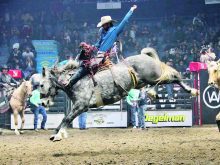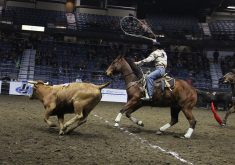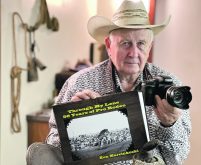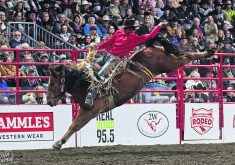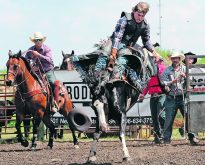Most rodeos in 2020 were cancelled due to the COVID-19 pandemic. But in the spring of 2021, the Calgary Stampede said it would be doing as much as it could to bring the rodeo back after losing $26.5 million in 2020 due to its cancellation. This comes as vaccinations continue across the Prairies.
Smaller rodeos are slowly making a return as well, following deep losses in 2020.
Lenora Bells works in Partnership Marketing with the Canadian Cowboys Association based out of Regina. The lack of a 2020 rodeo season took a toll on the non-profit organization.
Read Also

Trump’s tariffs take their toll on U.S. producers
U.S. farmers say Trump’s tariffs have been devastating for growers in that country.
“Well, financially, it hits hard,” Bells said.
“It hits hard with our communities, too, because, of course, the economic impact of all the rural communities, when we don’t have a rodeo, their major function of the year doesn’t happen.”
But the organization received some support when things looked most dim.
“We had some Saskatchewan tourism grants that came forward and of course, we had the wage subsidy and the rent subsidy programs that came along.”
The cowboys association, which sanctions rodeos across the Prairies, has scheduled 35 rodeos so far for the summer of 2021, with more than half of those determined to go ahead.
The association created a set of approved public health guidelines for the rodeos. Currently, rodeos are permitted to have a limited number of spectators, but that could be lifted on July 11 when restrictions are loosened as vaccinations progress.
Mike Smith, president of the Chinook Rodeo Association in Alberta, said his organization was able to run a few rodeos in the summer of 2020 and the winter, but none had rough stock. Now, he’s hoping for a return to more regular rodeos.
“Since they’ve opened up a few things here in Alberta, we’ve had about four or five committees say they want to put on a full rodeo with rough stock and as big of crowds as they can,” Smith said.
Although event organizers are required to follow Alberta health restrictions for COVID-19, Smith said things are starting to loosen up for the summer.
“For the summer they’re telling us now that as of another week or so we can have a third of our crowds,” he said.
Roy Call is a co-owner of C+ Rodeos based out of Williams Lake, B.C., a stock provider for local rodeos. He said they posted catastrophic losses in 2020 and even though things are slowly opening up for the 2021 season, the situation remains dire.
“We ended up with a complete 100 percent loss of revenues last year,” he said. “And this year we are again at zero rodeos for now, but we anticipate a couple of rodeos progressing a little bit later in August and a couple of small events in July, but no crowds in July.
“So we’re going to be looking at a 100 percent loss of 2020 and probably a 95 percent loss of 2021.”
Because of the loss in 2020, C+ Rodeos reduced its inventory by 50 percent, leaving only breeding and young stock.
“The ones that we got rid of were older, weaker stock that we used for our high school rodeos or smaller amateur rodeos, so that’s going to be a bit of a challenge.”
However, C+ Rodeos received funding from the British Columbia government to help ease the losses.
Call said he’s grateful rodeos are starting to happen again.
“We’re really happy to have anything happen this year to get the kids back interested in rodeo and to make sure that there is a rodeo business to come back to,” Call said.
“I think we’ve all missed interacting socially with this, being able to do things with our friends and go places. It’s nice to have even a little bit of a glimmer of hope.”





